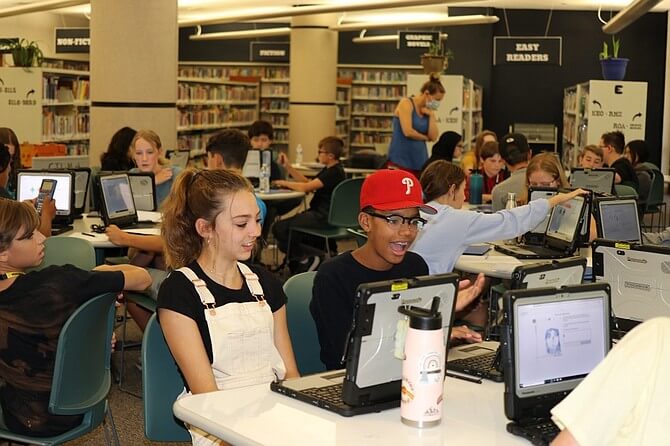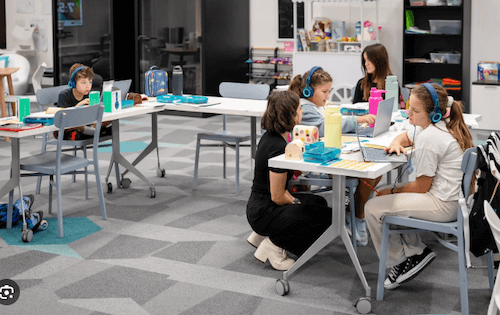The landscape of education is constantly evolving, and AI for kids is at the forefront of this transformation. As parents, it's natural to feel a mix of excitement and apprehension about these new technologies. You might be wondering how to navigate this new landscape while still being the best support for your child's learning journey. This comprehensive guide highlights the best free AI homework helper tools specifically designed for kids aged 5–12, alongside practical, parent-tested tips for integrating them effectively into your family's routine.
Screen Time: Finding the Right Balance in a Digital World
A common concern for parents today is managing screen time. While the idea of more digital interaction might initially raise an eyebrow, the key lies in intentional and purposeful use. These free ai homework helper tools are designed to be engaging and educational, offering a valuable alternative to passive entertainment when used within healthy boundaries. It's not just about limiting minutes; it's about prioritizing quality over quantity, ensuring that time spent on devices is productive and enriching. Understanding the pros and cons of ai education helps us make informed choices.
The Parent's Role: Guiding Learning, Not Just Monitoring
You are the cornerstone of your child's education. No algorithm can replace your encouragement, your questions, or the unique understanding you have of your child's learning style. These best ai homework helper tools are designed to support, not replace, your involvement. By actively guiding their use, engaging with the concepts they're learning, and fostering a curious mindset, you amplify the benefits of these digital aids.

Top Free AI Homework Helper Tools for Ages 5–8
For our youngest learners, the goal isn't just about getting answers; it's about sparking curiosity, building foundational skills, and making learning feel like play. These tools leverage AI for kids to create engaging experiences.
Khan Academy Kids: This has been a real find for our little one! It's completely free, which is a huge plus, and it feels like a vibrant, interactive world focused on early learning. What we love is how it covers everything from math and reading to even those tricky social-emotional skills, all with these joyful animations and characters that really keep them engaged. It's amazing how it seems to adjust to our child's pace. We've definitely seen progress in their early math skills, and it honestly doesn't feel like homework to them – they actually ask to play! Knowing it aligns with what they're learning in school and that it's ad-free is a big win for us as parents.
Duolingo ABC: For learning to read, this app has been surprisingly fun and interactive. It uses AI in a way that feels like a game, with lessons on phonics, sight words, and building sentences. It's really intuitive for young kids to use. We've noticed it's been effective in helping our kindergartener with those foundational reading skills. The lessons are short and engaging, which is perfect for their attention span, and it's been great for building their confidence in reading. It's almost "addictive" in a good way – they keep wanting to do it!
Lingokids: We've been using Lingokids for language learning, and it's been a fun, low-pressure way for our five-year-old to pick up early literacy and even some basic math skills through games and songs. What's neat is how it seems to adapt to how our child responds. For non-native English speakers, it feels particularly helpful. It blends learning letters and numbers with interactive stories, which has kept our little one engaged.
Important Caveat: Just a heads-up, the free version does feel a bit limited after a while, and you might feel a nudge towards the paid upgrade. Also, we've noticed some newer content, like those Blippi videos, and we're keeping an eye on whether they truly add to the educational quality.
Osmo (with free app components): This is a really unique system that combines physical toys with the tablet. Our child loves the hands-on aspect, using blocks and drawing tools that then come to life in the digital games. It's been great for teaching math concepts, coding basics, and problem-solving in a tangible way. The digital feedback they get as they play really clicks with them, especially for the math and logic puzzles. It encourages them to play together and really think things through.
Important Caveat: One thing to be aware of is that we did experience some issues with account logins and saving progress recently, which was a bit frustrating. Hopefully, they've sorted those out, as the core idea is fantastic.

Top Best AI Homework Helper Tools for Ages 9–12
As children transition into upper elementary and approach middle school, their learning needs evolve. They're ready for more complex problems, structured feedback, and tools that build study independence. These best ai homework helper apps support these goals.
- Khanmigo (Khan Academy): This ai homework helper free within the comprehensive Khan Academy platform, guides students through math, science, coding, and humanities questions without giving direct answers, fostering critical thinking. Free access is available, though some advanced features may require a donation.
- Why it's solid based on reviews: 2025 Reddit threads frequently praise Khanmigo's ability to act like a truly helpful tutor. One user commented, "Khanmigo doesn't just give you the answer; it asks questions that make you think, which is exactly what my 11-year-old needs to truly learn math fast." Common Sense Media rated Khanmigo highly for "transparency, safety, learning, and privacy," outranking general AI chatbots.
- CK-12 Flexi: Provides free, AI-powered adaptive learning paths in science and math, catering to individual student needs. It uses real-world analogies to explain concepts.
- Why it's solid based on reviews: Reddit users in 2024/2025 highlight CK-12's high-quality FlexBooks and Adaptive Practice. One user noted, "Their digital AI tutor named Flexi can answer all of your math and science questions, and explain the answers using analogies based on your interests." It's praised for its Socratic tutoring style that guides students to problem-solve.
- UpStudy: A free ai homework helper offering step-by-step solutions and explanations for math, science, and other subjects, with a focus on clarity and accessibility.
- Why it's solid based on reviews: Several 2025 app store and Reddit reviews mention UpStudy's clear and detailed explanations, particularly for math problems. Users describe it as a "lifesaver" for getting unstuck and making studying "more efficient and less stressful." One user wrote, "When my son gets stuck on a tricky algebra problem, UpStudy helps him understand the 'why' behind the answer, not just the solution."
- UpStudy as a Socratic Alternative: Notably, after Google's changes to the Socratic app, many former Socratic users sought alternatives. UpStudy became a go-to for some, with users commenting, "I'm actually so mad it completely sucks now... If you're looking for a new study tool, try UpStudy. I've been using it and it's pretty solid." Another user added, "omg I thought I was the only one using Upstudy lol. it saved my ass during the last final. tbh."
- EduBrain / StudyMonkey: These tools provide comprehensive homework assistance across a wide range of subjects and grade levels. EduBrain offers thorough, step-by-step explanations across more than 90 subjects. StudyMonkey is highlighted for essay assistance and tutoring.
- Why it's solid based on reviews: EduBrain is praised for breaking down intricate concepts and making learning enjoyable. StudyMonkey is noted for its versatility and quiz features, with users finding it useful for quick homework help. Both platforms offer free versions, though with limited queries or subjects.
General AI Chatbots: A Parent's Guide to ChatGPT and Gemini
Beyond dedicated homework apps, general AI chatbots like ChatGPT and Google Gemini (formerly Bard) can also be valuable tools for kids aged 5-12, but they require significant parental guidance and supervision. These are not designed specifically for young children, but their capabilities can be leveraged for learning.
- How Parents Can Use Them for Learning:
- Explaining Concepts: You can use ChatGPT or Gemini to ask for simplified explanations of complex topics your child is curious about. For example, "Explain photosynthesis to a 7-year-old."
- Brainstorming Ideas: For creative writing or project ideas, these tools can help brainstorm. "Give me 5 ideas for a story about a talking dog."
- Practicing Q&A: You can have the AI generate questions about a topic your child is studying, turning it into an interactive quiz.
- Learning About AI Itself: For older kids (10+), these tools can be a direct way to learn about how AI works, with parental oversight.
- Important Considerations for Kids 5-12:
- Parental Supervision is Non-Negotiable: These tools are not filtered for children and can generate inappropriate content if not carefully managed.
- Focus on Critical Thinking: Teach your child to "trust but verify." AI can sometimes give incorrect information.
- Avoid Cheating: Emphasize that AI is a learning aid, not a shortcut for doing the work.
- Age Appropriateness: While some teens (13+) use ChatGPT for homework , for kids 5-12, direct interaction should be heavily guided by a parent. Google's move to make Gemini available for younger children has raised concerns among parents about default access and potential negative impacts on learning and critical thinking.

Tools to Approach with Caution
While many apps promise to be the best ai homework helper, some come with significant drawbacks that parents should be aware of.
- Prodigy Math Game: This game-based math learning platform uses an RPG-style fantasy world to engage students. Its AI adapts question difficulty.
- Why to be cautious: Despite its engaging format, Prodigy Math is heavily criticized for its aggressive and "predatory" microtransaction model. Parents report that the "questions are so basic as to be irrelevant" in the free tier, and progression is hindered without purchasing memberships. This can lead to children guessing answers to advance in the game rather than focusing on the math, effectively providing "zero educational value" for some users. It's seen as teaching kids about "microtransactions and p2w schemes" at a young age. Users often find it "too much of a game and not educational enough" in its free version, leading to distraction rather than learning.
- Synthesis Math Tutor:
- Synthesis math tutor, uses educational philosophies that were developed by Joshua Dahn, who after tutoring Elon Musk's children, helped create the school for SpaceX employess, that focus on first principles thinking, decision making, and collaboration
- Our Family's Experience: From our own family's experience, our 5-year-old found Synthesis Math Tutor entertaining, and we appreciated its approach to explaining addition, subtraction, multiplication, and division through different games. However, we encountered a few challenges. While the AI (which they call 'Grok') would pause to give our child time to think, creating a seemingly interactive experience, there weren't enough easier games for younger kids. This meant our child often played the same games repeatedly. Furthermore, when we stepped in to help, the AI would interpret our assistance as the child's own progress, leading to increasingly harder tasks. This often left our child frustrated, as the AI would simply wait for a solution without recognizing whether it was the child or the parent who solved the problem.
Navigating Other Digital Worlds: A Look at Minecraft
Beyond dedicated homework helpers, many parents wonder about the broader digital worlds their children explore, like Minecraft. While often praised for creativity, it's important to understand potential concerns.
- General Concerns for Kids:
- Addiction and Screen Time: Like any engaging video game, Minecraft can be highly addictive, leading to children constantly asking to play and potentially neglecting other responsibilities. Parents report struggles with self-regulation, with kids having "zero self regulation when it comes to screen."
- Community Issues: While generally family-friendly, playing online with others can expose children to negative interactions or inappropriate content if not monitored.
- "Brain Melting" Content: Some argue that the endless online content, particularly YouTube "Let's Plays," can be "crack for the undeveloped brains of 5-year-olds" due to a lack of self-regulation capacity.
- Specific Concerns for Christian Parents:
- Magic and Witchcraft: Some Christian parents express concern over elements like "enchanting" (adding magical properties to items) and "potion making" within the game, viewing them as forms of witchcraft.
- Mysticism and Idolatry: Concerns can extend to the game's mystical elements (e.g., portals, the Nether) or the idea that the game could become an "idol" if it takes up more time and focus than a child's relationship with God.
- Differing Interpretations: It's important to note that views among Christians vary widely. Many see Minecraft as a positive, creative outlet, comparable to LEGO, with its cartoonish violence being non-graphic and modifiable. Others emphasize that the focus should be on teaching moderation and balance, rather than outright banning.
How to Use AI Tools Effectively
Integrating these best ai homework helper tools into your child's routine requires intention and strategy.
- Set Clear Time Limits: Establish clear boundaries to ensure a healthy balance with offline activities. Discuss these limits with your child so they understand the "why" behind them.
- Engage with Your Child: Don't just hand over the tablet and disappear. Sit with them, ask them what they're learning, and discuss the concepts together. This interaction is crucial for solidifying knowledge.
- Focus on Understanding, Not Just Answers: Encourage your child to explain how the tool helped them arrive at an answer, rather than just accepting the output. Ask "Why do you think that's the solution?" or "Can you show me the steps?" This turns the ai homework helper into a true learning partner.
- Explore Together: Take time to explore new tools with your child. Understand their features, strengths, and how they can best support learning. This also models a positive approach to technology.
Final Thoughts: Smart Tools, Smarter Parenting
The rise of AI for kids in education presents an exciting frontier. These best free AI homework helper tools are powerful resources, but their true value is unlocked when combined with your active involvement. By choosing the right tools that fit your child's age and learning style, considering real user feedback, and staying engaged in their educational journey, you can help your child thrive in this evolving educational landscape.
Remember, technology can't replace the human connection in learning. It can, however, make your role as a parent-educator more efficient and enjoyable. Embrace these innovations with care, and watch your child's curiosity and confidence soar.
Ready to explore these helpful tools and try more free fun AI projects with your child and discover how to integrate technology effectively?
With a background in trading, I’ve been fascinated by how many ppl in 20s and 30s manage real investment portfolios — often with surprising success. It’s a powerful reminder of how much can be self-taught when curiosity meets real-world feedback. My experience, including my time at UC Berkeley, and as a father of one kid in elementary school, drives my work at AIFunLab.io, where we build tools that motivate young children take charge of their own learning journeys.


.svg)




















